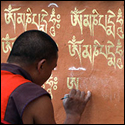|
Due to the lack of company on new year's eve, I'll go to a japanese buddhist temple here in Düsseldorf, where there will be some sort of ceremony (we'll get to ring a bell, I think?). Is there anything you would say I should know beforehand to make the experience more interesting?
|
|
|
|

|
| # ? May 15, 2024 19:11 |
|
If you're not the same sex as the temple officiants, hand everything to a lay member of the same sex first/recieve things similarly. Don't point. Other than that I wouldnt really know. It's not the lunar new year for another month.
|
|
|
|
I'm very carefully trying to approach Buddhism (after being a materialist atheist for 10 years) and there seem to be two sanghas near the place I live I could try. The first belongs to the Diamond Way tradition, which seems to dominate in my very non-Buddhist country. Their spiritual director is the 17th Karmapa Thaye Dorje. I have no idea how are they distinct from other variants of Buddhism and don't know too much about vajrayana, so I don't know what to expect. Wikipedia is not very helpful. The second one is a Kwan Um Zen center, whose founder is Seung Sah. I'm somewhat wary of this one, because of what I read here: Wikipedia posted:The Kwan Um School emphasizes socially engaged 'together action' by groups of followers living in a common house, koan or mantra practice tools, and a pastor-parishioner relationship between monks and laypersons characteristic of the Chogye order in Korea."[13] I may be overly paranoid, but this sounds a bit cult-ish. Nevertheless, I know very little about these two traditions. Is there anyone here who could expand this topic?
|
|
|
|
Kwan um is cool. Seung Sah' disciple Hyun Gak Sunim is really funny and cool also
|
|
|
|
Gantolandon posted:I'm very carefully trying to approach Buddhism (after being a materialist atheist for 10 years) and there seem to be two sanghas near the place I live I could try. Caveat: I'm not a Buddhist, just some guy with a passing interest! However, I've looked into Diamond Way, since as you said they seem dominant here, and they give off a huge cult-y vibe Especially their actual leader, Ole Nydahl, has had some very shady conduct and if you google him there's a lot of controversy. Like, I'm not an expert but I'm pretty sure "the path to enlightenment is my dick" is not a legitimate Buddhist teaching 
|
|
|
Guildencrantz posted:"the path to enlightenment is my dick" is not a legitimate Buddhist teaching poo poo, I wish this was the thread name now.
|
|
|
|
|
Gantolandon posted:I may be overly paranoid, but this sounds a bit cult-ish. Hi! Let's start with the following: Neither's a cult. Kwan Um is chill, and Diamond Way appears cult-y as hell. But that's just vajrayana for you, first you do ngondro yogas, and then you do guru yogas, then drink-the-flavour-ade-yogas.:v So first: Diamond Way is probably better for you, and also worse. Your first problem with confronting anything buddhism is that you're coming into it from a pretty solidly abrahamic mindset (Most atheists still cling to abrahamic mindsets, just reframed in a non-theistic way). It's all going to seem bizzare and because of your materialist way of thinking it's all going to seem like a horrific cult. Zen or Vipassana are the best way to ease into it without feeling overwhelmed. But that being overwhelmed is also a good thing: It could turn you off of the Dharma and that's Bad. But if you go into something more focused on "Hey let's just meditate and deal with dharma talks later" Then you misconstrue the faith as a philosophy. Kwan Um is good here because they particularly have a strong relationship with getting people into the sangha: Really solid Master-Disciple stuff. The whole communal living thing will be more pushing you to do retreats and uposatha observances. It's not "HEy give us your money and come live in a van" It's more "Listen being a monk is what will make you a bodhisattva, pratyekabuddhahood is super hard." It's been talked about before: Buddhism's biggest flaw is its' monastic orientation- that's what that's about. Diamond Way. . . It's run by a white dude, and you're all racist. Admit it; that's a big reason it seems more like a cult than shambhala (Chogyam Trungpe has WAY more controversy). It's not a cult, I promise you. But it might be heretical! So here's the run-down. In 1959 poo poo went south for tibet. Tons of leaders fled, among them the Karma Kagyu (The Dalai Lama of the Kagyupa buddhists). He taught Ole Nydahl: and what this means is that Nydahl has a pretty legitimate claim to being a Kagyupa lama. However, the Karma Kagyu died: There were two candidates and both managed to be enthroned. The one Communist China supports is the one most Kagyupa support as the legitimate heir; Others like Sharmarpa and Diamond Way support Trinley Thaye Dorje as the heir and 17th Kagyupa. So if they're backing the wrong person then they're technically heretical. Now Vajrayana is full of all kinds of crazy rituals and devotions and religious practises in general; Diamond Way (And shambhala) throw a bunch of these on the backburner to make something more approachable for westerners (Whitey). Their worry is that all the ritual and faith will set your atheist sirens off the way christianity does. Despite that, they have to break you of your mindset and get your mind thinking a certain manner: This is where a bunch of your initiate level rituals help: after doing hundreds of thousands of Yogas, suddenly approaching the more mystic yogas is something that you're able to accept without rejecting it outright as superstitious hooey. And yes, there's poo poo tons of sketchy seeming stuff. Welcome to tantrayana where you look at crazy mandalas and your buddhas wear a necklace of screaming skulls. Mull it over, carefully. Decide what the right path of dharma is for you. Can you handle something with more ritual? Are you strong enough to handle the self-education to make zen work? This is the big thing: How do you want to approach this religion, so that you can fulfill yourself and not walk away utterly hating it/converting to islam/treating it as a philosophy. I'll warn you: Diamond way is pretty much shambhala but supporting a different Kagyupa: There's going to be Tons of hippies. Kwan Um will either throw you out for being white; or wind up feeling more like a meditation class unless you can commit yourself. That's how it breaks down! Guildencrantz posted:Like, I'm not an expert but I'm pretty sure "the path to enlightenment is my dick" is not a legitimate Buddhist teaching Drukpa Kunley proves you're just flat-out wrong.   http://imgur.com/tjyyG6C http://imgur.com/tjyyG6C 
|
|
|
|
Does anyone here observe Uposatha days in their tradition? It is common among more serious Theravada practitioners to take 8 precepts on those days, and sometimes to spend the day at the local monastery or meditation center to practice with the rest of the sangha. I looked at a wiki article and it mentioned that it is practiced in Mahayana countries but I haven't heard anyone else mention it. I was thinking about trying to observe them this year when I am able as a way to put a little energy into my practice. People Stew fucked around with this message at 17:57 on Jan 1, 2014 |
|
|
|
Really, taking the eight precepts on uposatha is more of a theravada thing. but mahayana countries will observe vesak. They'll observe maghala puja and maybe asalha puja. but alsa puja and pavarana are more of a theravada thing. important mahayana dates are the days of bodhisattvas.
|
|
|
|
Quantumfate posted:[a lot of info] Thanks! It's a lot more to consider than I thought. quote:Can you handle something with more ritual? I have no idea, to be honest. Could you tell some more about more problematic stuff I should expect?
|
|
|
|
Gantolandon posted:Thanks! It's a lot more to consider than I thought. I do not practise Vajrayana; so take this with that in mind. You'll have to cope with things like offering money or food or water or incense to deities or the equivalent (Celestial beings like bodhisattvas that aren't gods), you'll be encouraged to participate with stuff monks will do like prayer wheels or fire pujas. You'll start yogas with chanting for long life of the guru, it'll be very master-student oriented. A lot of your novitiate practises will be done more for your getting into the habit of rituals than to teach you anything. The purpose will be to break your mindset so that when you get into the higher tantric practises you can accept them as lessons. It's less blind faith to deities (though for your average tibetan. . .) but that's still ritual you'll have to become used to. It's less superstitious than it'd first seem. I promise you that. Buddhism in all its flavours is very empirically oriented. You just have to break some core concepts like "I am a thing, my soul is a thing" or "This is a philosophy". And that will be hard to do with any zen practise; which for many people is just a class to meditate. EDIT: Shakyamuni's birthday on the 8th, new year starts on the 30th. Going to throw up a new set of dates in the OP, try to be inclusive for everyone. Quantumfate fucked around with this message at 23:57 on Jan 1, 2014 |
|
|
|
What exactly is meant by "abrahamic mindset"? It that another way of stating the "I have a soul/I am me" way of thinking?
|
|
|
|
Buried alive posted:What exactly is meant by "abrahamic mindset"? It that another way of stating the "I have a soul/I am me" way of thinking? Yes. The whole ego-differentiated self, the great chain of being, the conception of divinity as father and not the mystic. Most atheists I run into online or in person, even though they deny the concept of a soul or of god- they've still been enculturated into thinking of a reified ego that stands apart from the world. Still lack the idea of the mystic experience- abnegation of the ego.
|
|
|
|
is looking at lolcats breaking the 7th precept?
|
|
|
|
On the Abrahamic mindset, I'd expand on that even further. People in the West are inundated with and encultured by our surroundings. Regardless of our previous beliefs and such, regardless of whether we're coming out of Catholicism or atheism or whatever, our cultural mindset is very much based on Abrahamic ideas. Among them, ideas not just concepts about the soul, but much more fundamental principles about agency, guilt, sin, and so on are very much ingrained in us and very much need sloughed off to function within a Buddhist paradigm. For example, it is very difficult for us to stop thinking in terms of "breaking precepts" as a sin that requires some kind of absolution. It becomes even more complicated when the translations use terms like "purify" or "cleanse" which we similarly use in our language about sin and forgiveness in the West. Our very principle mode of thinking is very much based in this idea of "I sinned, so I need to be forgiven for that sin to be absolved of it." This is not just an idea mired in religion, but in the entire way our culture deals with concepts such as wrongdoing. It is a deep, core value that permeates the entire culture, regardless of our religious affiliation. So when we approach Buddhism, and we, say, drink or overeat or whatever, there is this concept that we feel we need forgiven of this by someone. Add to this that you might well be told to say a Vajrasattva mantra to purify the karma, and there you are. There's also an idea of this sort of "all or none" concept that is very much found in Abrahamic religions (you either are baptized or you aren't), which isn't present necessarily in Buddhism. There's a lot of talk about holding precepts, and precepts are very important, but this idea of being a "good Buddhist" and therefore you must hold all the precepts and do all the rituals and practice like a Bodhisattva are somewhat misplaced I think, and largely a problem of us kind of taking Buddhism and wearing it like an identity, like an Abrahamic religion would have us do. Refuge is a ceremony, but it's not like baptism where you take refuge and tada you're Buddhist. You can be Buddhist and not take refuge formally. You can take refuge formally and not practice Buddhism. There's no "ontological mark on the soul" like Catholicism or other Christian religions believe are formed during baptism or ordination, because of their Platonic and Aristotelian influences. Refuge is just a thing you do. Literally the refuge vows are "I go for refuge in the Buddha, the Dharma, and the Sangha." And it means exactly that. Most Tibetans are Buddhist, and most of those Tibetans hold one or two precepts. If you are a five precept holder in Tibet and not a monk, you're maybe considered a very dedicated Ngakpa, and some people may even see you as something as a try-hard (though there is respect in that). So this idea like, "I get baptized, then I don't sin, and if I sin I confess and do reconciliation" and so on is not really applicable. And even though many people coming from non-Christian backgrounds may say "oh, well I'm not Christian so that's not how I see the world," the fact is our whole culture is structured around these concepts. It's very fundamental to the Western mindset, tied up in concepts of justice over mercy and so on. So yeah, I don't think that it's unfair to say Abrahamic religion has caused a large degree of complication for people investigating Buddhism, because we want to instill concepts into it that are fundamental to us, without considering that they may not be fundamental elsewhere. The other problem is that the Buddhism we get in the West is culturally misplaced, and so offered through a lens that is appealing to the West. Like Quantumfate mentioned, Tibetans actually literally believe that there are protector deities that protect them. They believe that rituals can act like magic. They believe that prayer flags literally bless things that are near them. When we see that, we think "oh look at this primitive religion" or we think "oh, well this is just goofy paganism." Then we have lamas and monks come and teach who say "no, those deities aren't physical beings that we need to propitiate. They're concept-emanations which exist in conceptual reality through our projection" or whatnot, and it's like "what the hell is all this?" But through working through it, we learn. Vajrayana for example is all about developing virtuous traits and ethics view practical means rather than through contemplative meditation alone. So a Vajrayana practitioner might practice "deity yoga" wherein they meditate on how they are inseparable from the deity. The deity might be, say, Chenrezig, who is an emanation of compassion. So by meditating on literally being Chenrezig, I develop those traits the way an athlete can visualize themselves playing and improve. And, in Vajrayana, we treat the deity as very much real, because the deity's true nature is ultimately emptiness, just like ours, whether they exist in material reality or not. So it gets a bit twisty. For some people, that's just fine. They're ready for that and can work with it. Some people it's really intuitive and workable for. Some people, not so much. I think the typical lama would say that this is dependent on karma and merit. Certainly such is the case in my tradition. The idea is that you should do what you feel you should do, practice how you can under the guidance of a qualified lama. You will meet obstacles and overcome them according to your karma. For some people, the "I don't believe in gods" obstacle prevents them from approaching, and that's fine, you know? Someday they will overcome that obstacle, in this life or another. For other people "I don't believe in gods" isn't an obstacle. Perhaps their karma is right for that. No big deal.
|
|
|
|
Paramemetic posted:I USE TOO MANY WORDS I love you Paramemetic, this is exactly what I am trying to say, and trying to avoid saying with tons of words. Please just marry me you filthy pagan. On a different note: How's the Red Pine commentary and translation on the Lankavatara compare to DT Suzuki's? Is there another english translation/commentary of the sanskrit? Rotten Punk posted:is looking at lolcats breaking the 7th precept?  
|
|
|
|
I have a lot of what would probably be considered pretty esoteric questions about various practices and Sutras. For instance, some years ago I learned the Cundi, or as I first heard it called, Zhunti Mantra. In the Cundi Dharani this is one of the benefits the Mantra may provide “Another dharma is to recite the mantra 300,000 times in front of a pagoda, a Buddha image, or a pagoda containing holy relics. Furthermore, on the fifteenth day of a waxing moon, make a large offering and recite the mantra mindfully without eating food for one day and one night. You will even be able to see Vajrapāṇi Bodhisattva, and he can take you to his palace." Does this sort of thing work, or is it a kind of incredibly subtle metaphor. I enjoy the sound of chanting the Mantra in general and will do so out of habit, like a pleasant song stuck in my head, but I haven't attempted anything , I almost want to use the word "Ritualistic". I have a lot of questions, and find material like this incredibly interesting. When it comes to this sort of practice I tend to be a heavy skeptic, and wouldn't really attempt it either way without some help of a true Dharma Teacher, which I still haven't met.
|
|
|
|
Lordboots posted:Does this sort of thing work, or is it a kind of incredibly subtle metaphor? Ultimately everything is a subtle metaphor. There is no Cundi beyond what is attributed; there is just compassion. There is no vajrapani, there is just protection, resolution. Both are empty of any real essence- The Hridaya Prajnaparamit reaffirms as much. If you recite the mantra 100,000 times, each time the full dharani, each time visualizing compassionate cundi, you will have auspicious dreams. If you are having the vipaka of worse karmas then you should do it a further 200,000. If you still have those vipakas bearing fruit and clouding your auspiscious dreams, recite a further 700,000 times. Each time the full dharani, each time the visualization. Find a bhikku to help you with this. I guarantee no one in this thread is at a point where they can answer you appropriately.
|
|
|
|
My main exposure to Buddhism has been through Theravada, but I have very little exposure to any of the other schools. I've read some of the descriptions of each school being a "vehicle", comparing Theravada to a car, Mahayana to a bus, and Vajrayana to an airplane, but ultimately I don't see any reason to favor one over the other. Is there any reason apart from circumstances and fate why one would choose to follow one school rather than another? Is there any reason why we should want to seek awakening as quickly as possible, even if it meant we might possibly put ourselves in more danger?
|
|
|
|
Because the different schools all have different philosophies. Not always as clear-cut between vajrayana and mahayana. But hugely different between mahayana and theravada. The sutras for one, the different treatment of people who aren't monks. In mahayana it's considered possible to reach enlightenment no matter who or what you're born as. One of the important early figures in a sutra is vimalakirti, who argues with manjushri about the buddhadharma. Mahayana also looks less at attaining enlightment, more helping every other being come to that situation and position in their life.
|
|
|
|
Jacobeus posted:My main exposure to Buddhism has been through Theravada, but I have very little exposure to any of the other schools. I've read some of the descriptions of each school being a "vehicle", comparing Theravada to a car, Mahayana to a bus, and Vajrayana to an airplane, but ultimately I don't see any reason to favor one over the other. Is there any reason apart from circumstances and fate why one would choose to follow one school rather than another? Is there any reason why we should want to seek awakening as quickly as possible, even if it meant we might possibly put ourselves in more danger? I would hold that there's not really any compelling reason why one would choose to follow one school over another aside from their own personal inclination and compatibility with that school. They all seek to attain the same thing, often through similar, but sometimes radically dissimilar, means. In the fire service, the truckies give grief to the engine guys and vice versa, but at the end of the day everyone respects everyone else and knows that we're all a big team. Same thing, in my opinion, with Buddhist sects. The Vajrayana might go "oh, Theravada is the lesser route because it doesn't attain enlightenment for other beings and is selfish" and Theravada might go "oh, Mahayana adds so many teachings that cannot be sourced to the Shakyamuni Buddha, so they are heretics" and Mahayana might say "oh, Vajrayana are just pagan wizards," but at the end of the day, we're all on the "same team" so to speak. The "good" reason most Vajrayana people I suspect would give for why they practice that sect (aside from "we're Tibetans and this is what we do in Tibet") would likely be that suffering of beings is overwhelming, and they want to end that suffering for as many beings as possible as quickly as possible to maximally reduce suffering. The cynical answer would be "because many Western converts want everything right away." But really, enlightenment in this lifetime, while possible, isn't even really the goal. The goal is to benefit sentient beings. I know that whether I attain liberation now or tomorrow or in 50 years or in 50 kalpas, there will be beings suffering what need compassion and lovingkindness. So we should do what we can in this lifetime. However, because our capacity to benefit sentient beings in this lifetime is also limited (as a suffering being, I can only reduce suffering so much, because the only true cure for suffering is liberation), so we should try to attain liberation for ourselves quickly so that we can benefit beings more completely.
|
|
|
|
So the different schools do disagree with one another on various matters. I got the impression that each school didn't necessarily consider the others to be wrong, rather they considered each other to be more like alternate paths to the same destination. I think one reason I'm drawn to Theravada is that it seems to make fewer ontological claims and deals more with the practice and empirical discovery through direct experience. But from my understanding of Theravada, it doesn't seem to be implying that those who aren't monks should somehow be treated without respect or kindness, only that the lifestyle of a monk is optimum for the attainment of enlightenment. But even a layperson can attain enlightenment eventually, they might just have to be reborn as a monk at some point in order to do it. It doesn't seem to make any claims that some people would never be able to attain it. Maybe not in a given lifetime, but not never. On the other hand, in Pure Land, which is part of Mahayana, I think it is claimed that it's no longer possible for human beings to attain enlightenment, and so they need to be reborn in the Pure Land in order to do it. That seems to go against the idea that it's possible for anyone to reach enlightenment no matter who or what you're born as. Granted this is just my knowledge from one trip to a Jodo Shinshu temple, so I might have some misunderstanding.
|
|
|
|
You are not misunderstanding; I am trying to be very carwful saying this because part of the bodhisattva vows is not to cast aspersions upon the practicing of the dharma. However, you are right about pure land, some sects such as nichiren take it further and say there is no longer any truth to dharma outside of the pure lands. As for the schools, they do, not between say, zen, chan and theon. But between Theravada and mahayana? Hugely. Theravada is a later attempt to return to Sravakayana style buddhism, thus the name. Theravada is a corruption of Sthaiviravada. Mahayana sees that as more selfish, backwards, outmoded. There's less cohesion between different mahayana sects than within theravada schools. Mahayana is in general all about three fundamental concepts: Attainment of Dharma outside the pali canon (And even in some cases non-reliance upon texts!). Acceptance of Bodhisattvas: Beings who have pledged to be born again and assist all others in attainment. Tathagatagarbha, which is the inherent buddha qualities of all beings. Conversely many Theravadins see Mahayana as a corruption, as heterodoxy. This is all without even touching vajrayana.
|
|
|
|
I sometimes think the supposed difference between the idea of Theravada being focused on personal liberation versus the Mahayana idea of focusing on reducing the suffering of others doesn't necessarily play out as strongly as it is sometimes claimed. In the end, striving toward skillful practice as laid out in Theravada is in itself a very efficient method of reducing the suffering of others. Acting skillfully and following the precepts and the eightfold path is very much an act of acting compassionately toward other beings and preventing your actions from causing suffering to others, not just priming yourself for enlightenment. They seem to be parallel paths, to me anyway. There is someone who posts at a Theravada forum I go to sometimes who has a signature that says: Secure your own mask before assisting others. – NORTHWEST AIRLINES (Pre-Flight Instruction). It makes sense to me I suppose. I am not familiar with the intricacies of the Bodhisattva vows but I think making a real an earnest effort toward purifying your own conduct is a very legitimate way to reduce suffering in the world for all sentient beings.
|
|
|
|
Jacobeus posted:So the different schools do disagree with one another on various matters. I got the impression that each school didn't necessarily consider the others to be wrong, rather they considered each other to be more like alternate paths to the same destination. I think one reason I'm drawn to Theravada is that it seems to make fewer ontological claims and deals more with the practice and empirical discovery through direct experience. But from my understanding of Theravada, it doesn't seem to be implying that those who aren't monks should somehow be treated without respect or kindness, only that the lifestyle of a monk is optimum for the attainment of enlightenment. But even a layperson can attain enlightenment eventually, they might just have to be reborn as a monk at some point in order to do it. It doesn't seem to make any claims that some people would never be able to attain it. Maybe not in a given lifetime, but not never. I wouldn't say disagreement is quite right. Generally speaking, nobody in the Mahayana or Vajrayana paths would say Theravada/Hinayana is "wrong." They would perhaps say it's incomplete, or that these people can only attain liberation but not true enlightenment, or something like this, but at least Vajrayana considers Theravada to be the foundational path. Other Dharmas only build upon Theravada, and Theravada alone is necessary and sufficient for liberation. And yes, Theravada considers the Vinaya to be the pro-path to liberation. Vajrayana considers it to be a good path, but not the best path, because Vajrayana is all about min/maxing liberation. And Mahayana considers it an adequate path, but emphasizes that the goal should not be personal liberation, but the liberation of all sentient beings. The main concept of Mahayana is that "how could I be liberated and happy, knowing beings who have been my mother still suffer in samsara?" Theravadans may or may not have problems with Mahayana on the grounds of the source of those teachings, but that's only one directional. You were correct before, and I'm sorry if I've confused you. Today, most Buddhists of different sects consider other sects to be simply alternate paths to the same destination. As for Pure Land, I don't know if that's generally accepted - all beings can (and will!) attain liberation. Pure Land practices, at least within my own tradition (Drikung Kagyu, a Vajrayana school) do not say it's impossible to attain liberation in this world, rather, it's substantially easier to do so in Amitabha's Pure Land. The general understanding on that in Tibetan traditions is that all Buddhas have a Pure Land (this is ontologically necessary: all Buddhas exist within the conceptual sphere, all Buddhas have a teaching, all teachings must have an audience, all audiences must have a place, therefore, Pure Lands must exist because Buddhas exist). However, the Pure Lands of many Buddhas require a great deal of merit to achieve. Amitabha, however, made a vow to make his Pure Land available to anyone who even hears his name at the time of death, or who calls upon him, or who "takes him up on it" so to speak. In my tradition, Phowa practices "fail safe" to Amitabha's Pure Land, if other forms of instantaneous enlightenment don't "go off." (This is also part of what I love about Vajrayana, is that it has such practices structured for contingencies. They really plan these things out, it's a very practical kind of sorcery, so to speak). The idea being, if I cannot merge my mindstream with the Guru, or attain spontaneous enlightenment at death, or whatever else, at the very least I should practice so that I can be reborn in Dewachen, so I can attain liberation and then come back to help sentient beings. Funny enough, my teacher has said he doesn't want to be reborn in a Pure Land, because it would be boring and he could not help sentient beings while there. To each his own! Here are some teachings from an enlightened being, His Holiness the 37th Drikung Kyabgon Chetsang Rinpoche, on the subject of the Pure Land practices from a non-Pure Land sect perspective: http://www.dharma-media.org/media/kagyu/drigung/chetsang/amitabha_dewechen.pdf I recognize that might not appeal specifically to you but it's good information that could be of use to someone, and is the basis of my knowledge of Pure Lands.
|
|
|
|
You're using hinayana unironically again. Also pure lands are not Pure Land buddhism. Pure lands in tibetan buddhism are just the same cosmological feature as you find in a lot of mahayana. Pure Land Buddhism(tm) instead refers to Japanese Buddhism from the kamakura era (excepting soto and rinzai) and Nichiren-shu/Nichiren-Shoshu. Specifically Jodo-Shinshu, Ji-shu, Yuzu Nembutso and Jodo-shu. Basically they took the idea of the ages of dharma and ran all out with it: We live in the age of Mo Fa (I don't recall the japanese) wherin the dharma is degenerating. Because the dharma is corrupt and because our ability to process dharma is waning, we must rely on outside or other power to attain liberation. Specifically the primal vow of Amitabha, and through special devotional acts strive for rebirth in his pure land. That's pretty different from the pure land concept you're talking about. All beings CANNOT, and WILL NOT, attain liberation without reliance on Amida Butsu.
|
|
|
|
Quantumfate posted:I do not practise Vajrayana; so take this with that in mind. You'll have to cope with things like offering money or food or water or incense to deities or the equivalent (Celestial beings like bodhisattvas that aren't gods), you'll be encouraged to participate with stuff monks will do like prayer wheels or fire pujas. You'll start yogas with chanting for long life of the guru, it'll be very master-student oriented. A lot of your novitiate practises will be done more for your getting into the habit of rituals than to teach you anything. The purpose will be to break your mindset so that when you get into the higher tantric practises you can accept them as lessons. It's less blind faith to deities (though for your average tibetan. . .) but that's still ritual you'll have to become used to. The 8th of what? Ive always been told Shakyamuni was born, illumined, died the full moon of May. Thus come, gone.
|
|
|
|
Quantumfate posted:You're using hinayana unironically again. Also pure lands are not Pure Land buddhism. Pure lands in tibetan buddhism are just the same cosmological feature as you find in a lot of mahayana. Pure Land Buddhism(tm) instead refers to Japanese Buddhism from the kamakura era (excepting soto and rinzai) and Nichiren-shu/Nichiren-Shoshu. Specifically Jodo-Shinshu, Ji-shu, Yuzu Nembutso and Jodo-shu. Basically they took the idea of the ages of dharma and ran all out with it: We live in the age of Mo Fa (I don't recall the japanese) wherin the dharma is degenerating. Because the dharma is corrupt and because our ability to process dharma is waning, we must rely on outside or other power to attain liberation. Specifically the primal vow of Amitabha, and through special devotional acts strive for rebirth in his pure land. So... if dharma is waning from the world and pretty much all enligtened beings get reborn in Amitabha's realm which is isolated from the rest of the world, doesn't it mean that not everyone will be able to attain enlightenment? It seems like the end result would be everyone able to be enlightened chilling out in the Pure Land and plenty of beings trapped outside, not even knowing their only way to salvation.
|
|
|
|
....not that it's a big dogmatic deal.
|
|
|
|
Gantolandon posted:So... if dharma is waning from the world and pretty much all enligtened beings get reborn in Amitabha's realm which is isolated from the rest of the world, doesn't it mean that not everyone will be able to attain enlightenment? It seems like the end result would be everyone able to be enlightened chilling out in the Pure Land and plenty of beings trapped outside, not even knowing their only way to salvation. Beings don't go to the Pure Lands to chill indefinitely. They go to the Pure Lands to attain liberation, so they can fulfill their Bodhisattva vows by voluntarily taking a rebirth again in Samsara, but as an enlightened being in order to liberate other sentient beings. Dewachen isn't a place to hang out, it's a place to go to train and attain liberation in order to benefit sentient beings. Again, this doctrine comes out of the Mahayana school, which does not find liberation of self without bodhicitta and the desire to help others attain liberation to be a "complete" enlightenment. So no, this scenario does not work, because the "end-game" is the liberation of all sentient beings. All sentient beings will eventually attain liberation. And, even if the Dharma following beings did end up in Dewachen and decide to stay, this would not preclude a Buddha manifesting, such as occurred historically with Shakyamuni, or with the innumerable Pratyekabuddhas.
|
|
|
|
Mr. Mambold posted:The 8th of what? Ive always been told Shakyamuni was born, illumined, died the full moon of May. Thus come, gone. Sorry, that's my bad. I meant enlightenment day, for some reason I put birthday, because. . . Anyways, it's just a minor doctrinal thing, the auspiscious day for his enlightenment is the 8th day of the 12th lunar month. The one on the full moon in may is Vesak, which is a day to commemorate shakyamuni's birth, nirvana and parinirvana. eh, differences. Gantolandon posted:So... if dharma is waning from the world and pretty much all enligtened beings get reborn in Amitabha's realm which is isolated from the rest of the world, doesn't it mean that not everyone will be able to attain enlightenment? It seems like the end result would be everyone able to be enlightened chilling out in the Pure Land and plenty of beings trapped outside, not even knowing their only way to salvation. Bear with me, I am having a bad day with my hands; writing things is super difficult for me to do right now. So, to ramble a bit more about Jodo Bukkyo and give some insight into the theological constructs here (Again understand I mean neither to disparage this flavour of Mahayana, nor do I practise it.) Yes, it does mean that not everyone will be able to attain enlightenment this kalpa. This finds its theological roots in things like the fa-xian translation of the mahaparinivana sutra which holds that an icchantika is so utterly severed from buddhadharma that, despite being posessors of it, their karmas will manifest so as to keep them from realizing tathagatagarbha. From this they arrived at (Because we are in the Ma Fo) all beings having become icchantikas. The only way then, to attain liberation is not through any capacity of individual karmic agency- But instead to realize the union with Amida Butsu that emanates from his Primal Vow that created sukhavati. Through participating in the concept of the Nembutsu (Namu Amida Butsu)we are capable of hearing the Name and attaining the pure land instantaneously. At the same time being reborn in the pure land and having set our karma in line to be nonexistent, for the true dharma will be spread only at Amitabha's feet. Until Maitreya is born. Paramemetic posted:Stuff
|
|
|
|
Does Zen only practice Zazen or do they also teach other forms of meditation? Do all the other traditions have their own "brand" of meditation?
|
|
|
|
In regards to the whole Mahayana/Theravada thing, I always understood that Mahayana really didn't view the Theravadan aims as actually that different, since in order to attain individual liberation you actually also have to attain bodhicitta, that compassion to help all sentient beings, and such a thing would naturally arise anyway regardless of your doctrinal inclinations. I'm just a lay practitioner who likes to read a bunch of stuff, but I remember reading something along those lines once, and it makes sense in my head at least.PrinceRandom posted:Does Zen only practice Zazen or do they also teach other forms of meditation? As far as I understand it, there are three main "types" of meditation in Zen. The first is Zazen. Then there is Shikantaza zazen, and Koan practice. While koan practice extends beyond just sitting meditation and rather pervades your entire waking consciousness, Shikantaza and Zazen are more along the lines of what we consider meditation. In zazen you usually have some object of meditation, such as your breath or the counting of your breath, while in Shikantaza you are literally just sitting there. There are some profound subtleties to Shikantaza that I honestly don't know enough about to describe but John Daido Loori has a great book out on Shikantaza if you want to learn more about it. Historically, there have often been doctrinal debates between different schools of Zen over whether koan practice or shikantaza is more effective towards reaching enlightenment. Also, it's interesting to note the similarities between zazen and shamatha, and Shikantaza and vipassana. One of my instructors mentioned how the Buddha developed 84,000 different types of meditation for the 84,000 in which we perpetuate samsara. I'm not sure if that's from the sutras (and if it's a Mahayana sutra or the Pali Canon) but it exemplifies all the different types of meditation available. For example, I practice Shambhala Buddhism, whose main practice is simple shamatha meditation. In it, you just follow the breath your eyes open. There are slight alterations depending on how much you've learned, such as only following and associating with the outbreath, changing the direction of your gaze, and so on. Theravada, and specifically the Insight movement, practice vipassana meditation and they all have their own "brand," so to speak, of meditation. So in a way, yes, the different traditions definitely have their own forms of meditation, but most if not all of the time you can find that at their root, they are just variations on two different themes, shamatha and vipassana.
|
|
|
|
So how should I deal with my dog during meditation? He's very clingy and tries to push himself into my lap; Should I just let him chill with me? If I try to close him out he'd tear the paint off my door...
|
|
|
|
If he will eventually fall asleep, I'd just wait with him and pet him until he is calm, then meditate with him nearby. I had to do the same thing with a needy cat at one point. It is a good exercise in patience and can be a chance to practice metta, honestly. Things like this that arise during daily life can be great opportunities to apply the teachings. In the case of my cat, she would always sit next to me and start loudly grooming herself when I would sit in the cushion, and it would infuriate me. Approaching these things with a mind of good will is a big help.
|
|
|
|
Edit: double post
|
|
|
|
PrinceRandom posted:So how should I deal with my dog during meditation? He's very clingy and tries to push himself into my lap; Should I just let him chill with me? If I try to close him out he'd tear the paint off my door... I read once that a lama taught "if you are meditating and a person disturbs you at your practice, tell them not to do it again. However, if a dog seems to want something, attend to its needs." This is a very practical teaching. Dogs don't stop when you tell them to gently caress off. If your options are let your dog ruin your house (and distract you while doing so), or sitting with a dog in your lap, sitting with a dog in your lap seems preferable. A dog is just another thing in the environment, and meditation is not so much about shutting out the environment as it is being mindfully aware of it. So yeah, I'd just chill with your dog. Let him get his meditation on, too.
|
|
|
|
My two cats, when i start meditating, are always funny and try to distract me. They sit on me, they want to be petted, etc. I just sit there and after a few moments they calm down and stay with me, it's quite relaxing ! At first it was annoying but now i love to let them do their stuff while i meditate, sometimes they even climb on me. As long as they dont inflict pain, it is okay !
|
|
|
|
It's easy to be mindful if you're sitting quietly in a room with a shrine and candles and whatever have you, you're calm, had a good day, the temperature is nice. But it is important as well, to be mindful of other things: When you're angry, sad, when something distracts you. As well, regarding pets: They don't know how to practise buddhadharma as much as we would like to help them. It's good then, to practise with your pets in some regard, so as to give them the chance to have skillful karma. IF you close them out, or cause them distress then you could give them the wrong idea about buddhadharma and their next birth might not be as fruitful. They've been given a pretty good one being the pet of a buddhist! There was a zen student, in the winter he went to his roshi and said he was having difficulty meditating because he was so cold. "Kill Cold." the master replied. In summer his robes caused him distress and discomfort. "Kill Hot" the master replied. So basically kill your dog.
|
|
|
|

|
| # ? May 15, 2024 19:11 |
|
Dogs are perfectly awakened beings who live entirely according to their nature. They do not waste time on empty conversation, and speak only in their own words, their own voice. Dogs are among the greatest of all teachers of zen. Cats are pieces of poo poo, however.
|
|
|




















